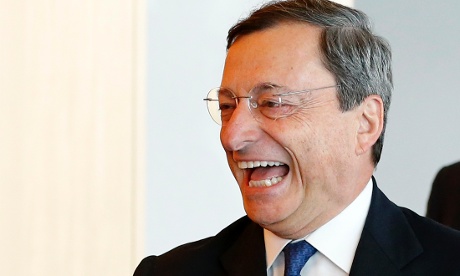After just 10 months in the job, the 64-year-old head of the European Central Bank has by turns impressed, disappointed and perplexed the markets
Another day, another chance to save the world. It is not without reason that Mario Draghi, president of the European Central Bank, is dubbed Super Mario.
He has a breadth of
experience few central bankers can boast, spanning academia, government,
the private sector and regulatory bodies. Educated at the prestigious
US university MIT, he has taught at Harvard and is one of Europe's best
economic minds. A stint at the World Bank in the eighties was followed
by a job as director general of the Italian treasury. He then moved into
the private sector, joining Goldman Sachs for five years; before taking
on the thankless task as governor of the Bank of Italy, where he was
credited with helping steer Italy's debt-ridden economy through the
crisis without requiring financial assistance. Most recently, he
impressed as head of the Financial Stability Board (FSB), a global bank
regulator that drafted the Basel III agreement – the new regulatory
framework for banks and other financial institutions.
His time in the US, in particular, is said to have influenced him, driving him to act early rather than take the German wait-and-see attitude that has often prevailed in Europe. He is said to be a good delegator, giving other members of the ECB governing board weighty roles and then letting them get on with it. Where his predecessor, Jean-Claude Trichet was known for being rigid and domineering, Draghi is applauded for encouraging discussion. Notably, ECB colleagues refer to Draghi as Mario, whereas Trichet was always Trichet.
But Draghi is careful to keep his private life private and is rarely seen in public with his wife. A few key facts are known about his past. He was orphaned in his mid-teens, when his biochemist mother and bank-executive father both died. Draghi was brought up by an aunt and later taken under the wing of Federico Caffe, a prominent Italian economist and university professor. A keen golfer, Draghi is said to maintain a work-life balance despite being in one of the most high-pressure jobs in the global economy.
Some say his performance on Thursday will decide whether he can keep that job. He has promised to do "whatever it takes" to save the euro. But does he have what it takes?
https://apps.facebook.com/theguardian/business/2012/sep/06/mario-draghi-profile-ecb-eurozone-crisis
His time in the US, in particular, is said to have influenced him, driving him to act early rather than take the German wait-and-see attitude that has often prevailed in Europe. He is said to be a good delegator, giving other members of the ECB governing board weighty roles and then letting them get on with it. Where his predecessor, Jean-Claude Trichet was known for being rigid and domineering, Draghi is applauded for encouraging discussion. Notably, ECB colleagues refer to Draghi as Mario, whereas Trichet was always Trichet.
But Draghi is careful to keep his private life private and is rarely seen in public with his wife. A few key facts are known about his past. He was orphaned in his mid-teens, when his biochemist mother and bank-executive father both died. Draghi was brought up by an aunt and later taken under the wing of Federico Caffe, a prominent Italian economist and university professor. A keen golfer, Draghi is said to maintain a work-life balance despite being in one of the most high-pressure jobs in the global economy.
Some say his performance on Thursday will decide whether he can keep that job. He has promised to do "whatever it takes" to save the euro. But does he have what it takes?
https://apps.facebook.com/theguardian/business/2012/sep/06/mario-draghi-profile-ecb-eurozone-crisis

Δεν υπάρχουν σχόλια:
Δημοσίευση σχολίου